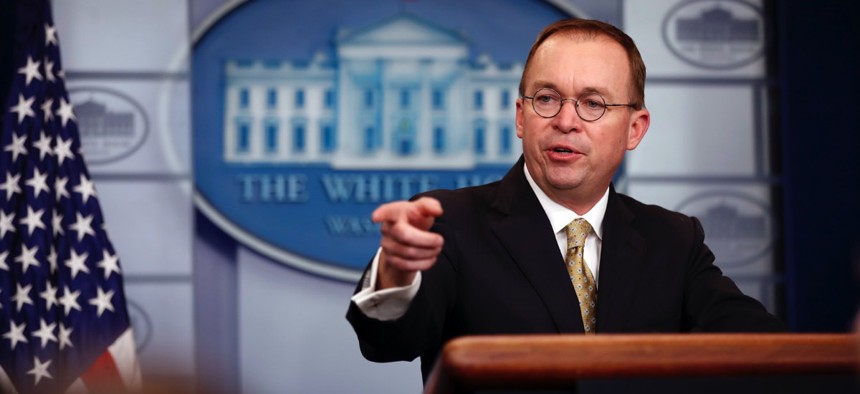Mulvaney Assures State AGs He’s ‘Not the Devil’

Office of Management and Budget Director Mick Mulvaney, who also directs the Consumer Financial Protection Bureau part-time. Alex Brandon / AP Photo

Connecting state and local government leaders
Just don’t expect new consumer protections from the Trump administration.
WASHINGTON — Mick Mulvaney for the first time outlined the Consumer Financial Protection Bureau’s priorities under his direction for state attorneys general on Wednesday—namely enforcing laws already on the books and education.
Better known as the Office of Management and Budget director, Mulvaney was appointed by President Trump to oversee CFPB part-time in November.
He sought to reassure the National Association of Attorneys General, at their winter meeting in the nation’s capital, that his tenure would bring “accountability, transparency and collaboration” with them, consumer groups and industry.
“Despite what you might have read, I’m pretty sure I’m not the devil; at least my wife and my mother don’t think that I am,” Mulvaney said. “So all the stuff you’ve read about me at CFPB I urge you to take with a grain of salt, except the part about me keeping Elizabeth Warren up at night.”
CFPB will run more cost-benefit analyses to determine priorities like debt collection practices, which account for about one-third of all complaints the bureau receives, he said.
Mulvaney defended not asking for money from the Federal Reserve last quarter because CFPB is sitting on an approximately $170 million reserve fund.
“I’m paying people at the CFPB to do economics research on climate change,” Mulvaney said. “I’m not sure how that happened, but we will see if we can’t figure out a way to change that.”
State AGs will be relied on “a lot more” for leadership on enforcement, he said, and to advise CFPB when an action is too costly or runs counter to their states’ best interests.
Pennsylvania Attorney General Josh Shapiro asked Mulvaney his philosophy on allowing states to pursue civil actions in federal court under the Consumer Financial Protection Act.
“Obviously you don’t have to go along, but you do have the power to intervene and stand in opposition,” Shapiro said. “I don’t want to put words in your mouth, but it sounds to me that your view is it’s case-by-case. You’re not going to take a blanket approach to oppose or support, and I think it’s important that we continue to have that latitude to bring the case.”
Mulvaney responded his interest is in spending CFPB efforts on “solid legal claims” rather than “very, very creative legal claims,” and in the event of the latter the bureau would “get out of the way”—allowing the state in question to file on its own.
Oregon Attorney General Ellen Rosenblum wanted assurances student debt would remain a CFPB enforcement priority—some states are considering providing students loan protections—and that the student debt ombudsman would remain in place.
“Our priorities will be going after things that are against the law, so if there’s activity in that space that is illegal, that is going to be our priority,” Mulvaney said. “We’re not going to look for reasons to sue people.”
The ombudsman position is statutory and would go unchanged, he added, calling stories about “dramatic” personnel changes at the bureau inaccurate.
Iowa Attorney General Tom Miller called consumer education an “enormous challenge” and warned shifting funds away from enforcement would be “counterproductive” because of the difficulties educating “enough people to make a difference.”
“In a perfect world, if you did your education absolutely perfectly, you wouldn’t have to do any enforcement at all,” Mulvaney said. “So I think it’s simply another circumstance where we’re looking at priorities differently than the previous leadership did.”
Dave Nyczepir is a News Editor at Government Executive’s Route Fifty and is based in Washington, D.C.

NEXT STORY: Democratic Congressman Looks to Rekindle Long-Dead Intergovernmental Commission





